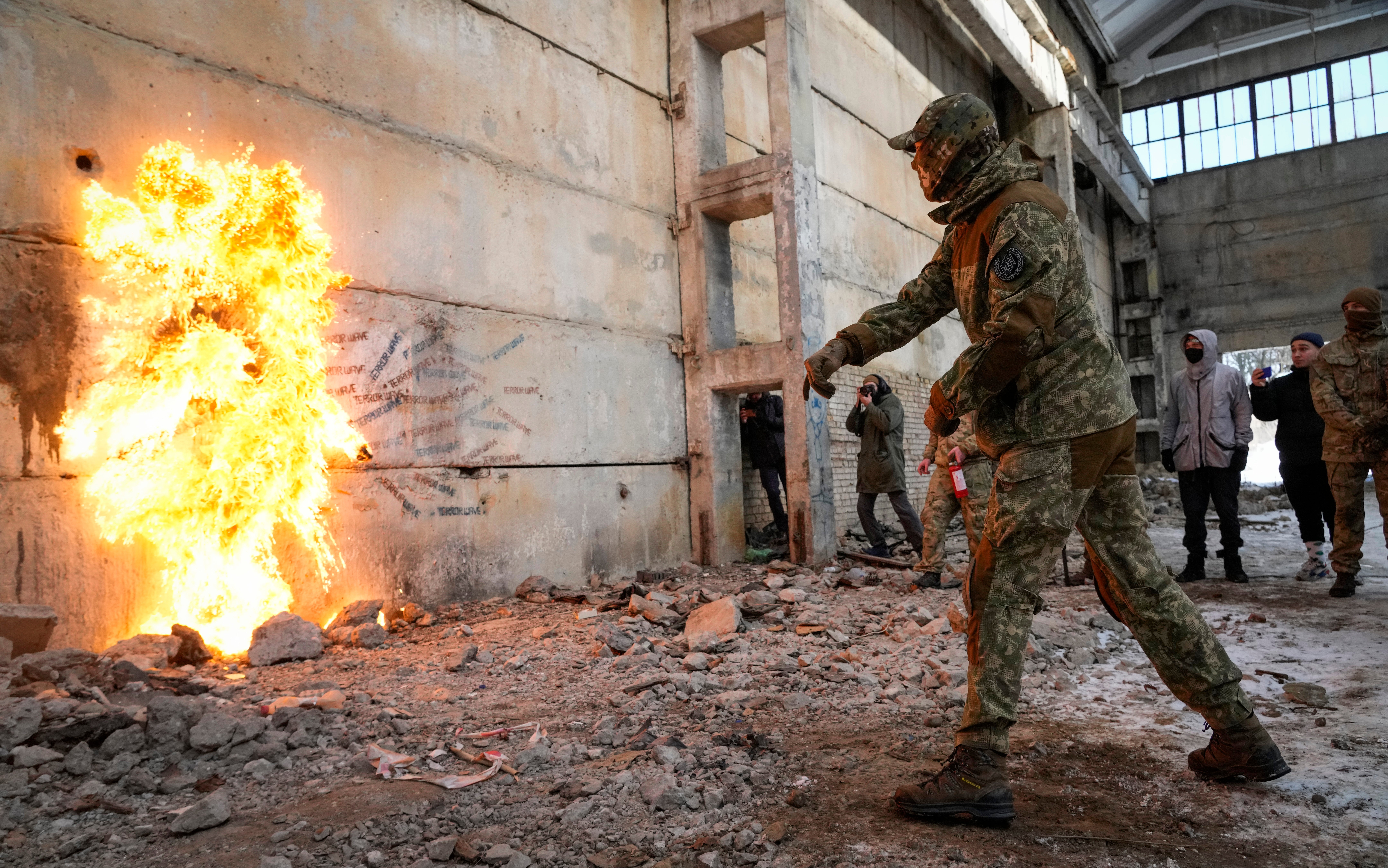Ukraine-Russia crisis: What to know about rising fear of war
Government leaders and top officials line up to walk the diplomatic tightrope that could mean the difference between war and an uneasy peace in Ukraine as Russia’s menace on the border of its neighbor continues unabated

Your support helps us to tell the story
From reproductive rights to climate change to Big Tech, The Independent is on the ground when the story is developing. Whether it's investigating the financials of Elon Musk's pro-Trump PAC or producing our latest documentary, 'The A Word', which shines a light on the American women fighting for reproductive rights, we know how important it is to parse out the facts from the messaging.
At such a critical moment in US history, we need reporters on the ground. Your donation allows us to keep sending journalists to speak to both sides of the story.
The Independent is trusted by Americans across the entire political spectrum. And unlike many other quality news outlets, we choose not to lock Americans out of our reporting and analysis with paywalls. We believe quality journalism should be available to everyone, paid for by those who can afford it.
Your support makes all the difference.Several of the world's top government leaders line up on Monday to walk the diplomatic tightrope that could mean the difference between war and an uneasy peace in Ukraine as Russia s menace on the border of its neighbor continues unabated.
Russian President Vladimir Putin stays in the Kremlin following his diplomatic foray to get support from China over the weekend and hosts the prime meeting of the day when French counterpart Emmanuel Macron will be seeking to de-escalate tensions.
Later, U.S. President Joe Biden will meet with German Chancellor Olaf Scholz at the White House to shore up Western resolve in what they see as Russian aggression.
Western estimates of some 100,000 Russian troops near Ukraine is increasing worries that a offensive could be days away. At the same time, borders of the NATO alliance are also being shored up.
FRANCE MAKES A BIG MOVE
Even if the 27-nation European Union as bloc has had little impact on the crisis, France has always felt it could force a breakthrough in the East-West stalemate, and Macron is the epitome of that confidence.
Moscow is only the first of a one-two diplomatic dance that will take him to Kyiv on Tuesday. His priority is simple — “dialogue with Russia and de-escalation.”
What makes execution much more complicated is the need to keep a unified Western front consisting of over two dozen players in the face of the Kremlin monolith, where one man's will faces precious little opposition.
Macron's essential challenge is make sure things don't get worse on the ground "before building confidence gestures and mechanisms.” In an interview with French newspaper Journal du Dimanche, he said Putin might make Ukraine only a means to achieve a bigger goal.
“The geopolitical objective of Russia today is clearly not Ukraine, but to clarify the rules of cohabitation with NATO and the EU,” Macron said. Even if Ukraine' security cannot be a bargaining chip, Macron said "it is also legitimate for Russia to pose the question of its own security.”
AFTER FRENCH MOVE, SO DOES GERMANY
France and Germany have worked in tandem before. Seven years ago, they were essential in creating a peace deal for eastern Ukraine in a bid to end the hostilities between Ukrainian forces and Russia-backed separatists that erupted in 2014 following the Russian annexation of Ukraine’s Crimean Peninsula.
Germany has been criticized for being slow and halfhearted in its approach to the Ukraine crisis but on Monday, Europe's economic juggernaut was moving on different fronts. As Chancellor Schulz was preparing his meeting with Biden, Foreign Minister Annalena Baerbock has meetings scheduled in Kyiv with President Volodymyr Zelenskyy and is set to visit the “line of contact” with pro-Russia separatists in eastern Ukraine on Tuesday.
Germany's show of solidarity amid tensions over Berlin’s refusal to send weapons. Yet Baerbock said that "we stand — without ifs or buts — by the territorial integrity of the country and at the side of people in Ukraine.”
Baerbock added that “together, we will react with hard and very concrete measures to any further Russian aggression against Ukraine.”
MORE TROOPS ON NATO'S EASTERN FRONT
Germany is also mulling sending more troops to Lithuania, potentially reinforcing its presence on NATO’s eastern flank. Defense Minister Christine Lambrecht has raised the possibility ahead of Scholz's meeting with Biden. The German leader is due to receive on Thursday the leaders of Lithuania, Latvia and Estonia, the three Baltic states who specifically feel the heat from Moscow, before traveling to Ukraine and Russia next week. Germany has led a NATO battlegroup in Lithuania for the past five years.
A few dozen elite U.S troops and equipment were seen landing Sunday in southeastern Poland near the border with Ukraine, following President Joe Biden’s orders to deploy 1,700 soldiers there amid fears of a Russian invasion of Ukraine.
Hundreds more infantry troops of the 82nd Airborne Division are still expected to arrive at the Rzeszow-Jasionka airport, 90 kilometers (56 miles) from Poland’s border with Ukraine. A U.S. Air Force Boeing C-17 Globemaster plane brought a few dozen troops and vehicles.
___
Sylvie Corbet and Vladimir Isachenkov in Moscow, and Geir Moulson in Berlin, contributed to this report.